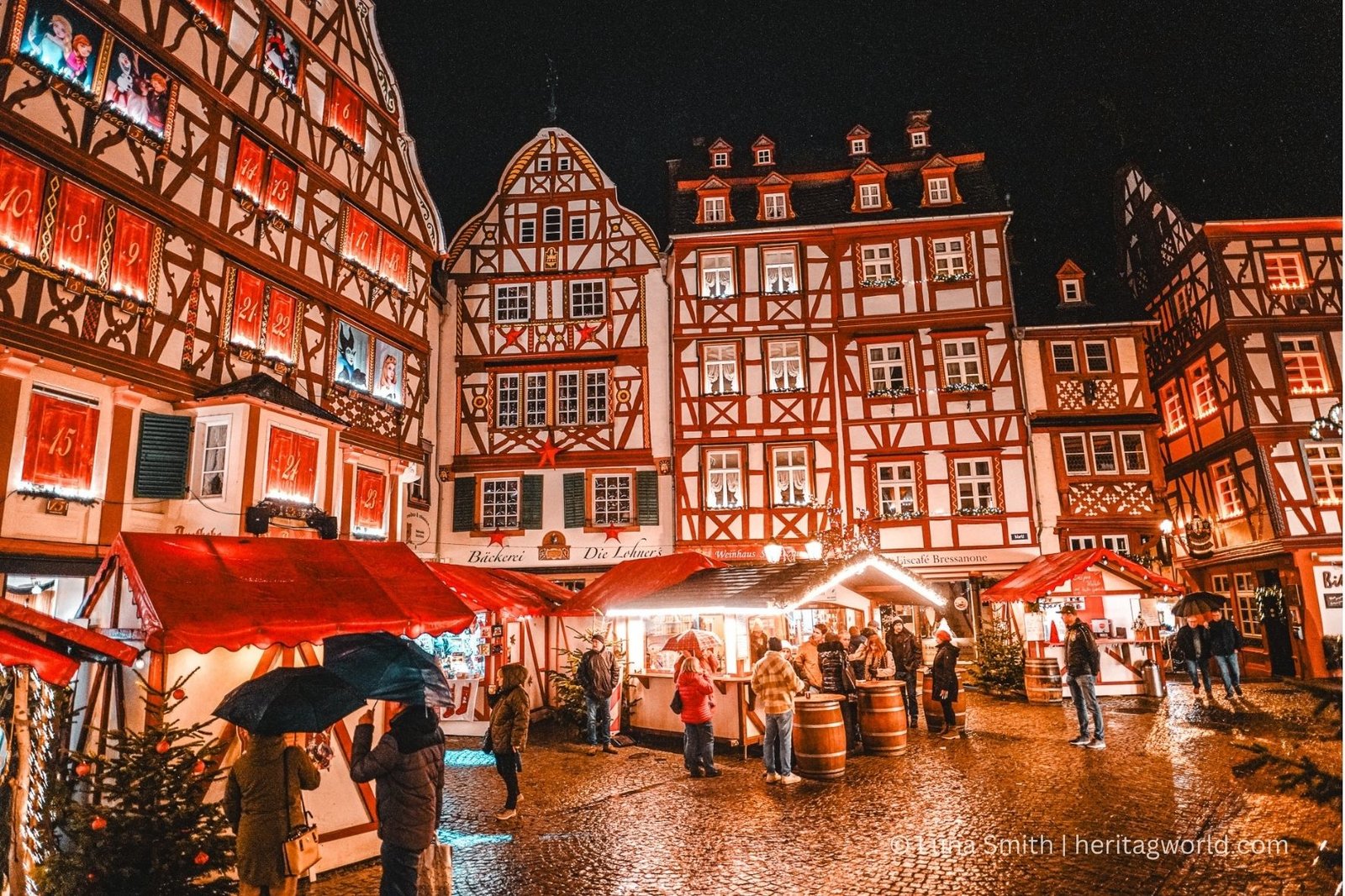Do Christmas markets in Germany accept credit cards?
Germany’s Christmas markets are magical. They bring the festive season to life. These markets began in the Middle Ages and are full of tradition. From late November to December, towns and cities turn into winter wonderlands. You will see twinkling lights, wooden stalls, and hear cheerful carols.
Each market is different. Famous markets like Nuremberg and Dresden are large and full of handcrafted gifts. You can find nutcrackers, stollen, and other Christmas treats. Smaller towns have cozy markets with fewer people but the same festive spirit.
The smell of roasted chestnuts and mulled wine fills the air. You can also enjoy sausages and other seasonal snacks. There are fun activities like ice skating, merry-go-rounds, and concerts.
Germany’s Christmas markets are more than just shopping. They are a wonderful way to enjoy the holiday season. The mix of lights, music, and festive food makes them truly special!
Do Christmas markets in Germany accept credit cards?
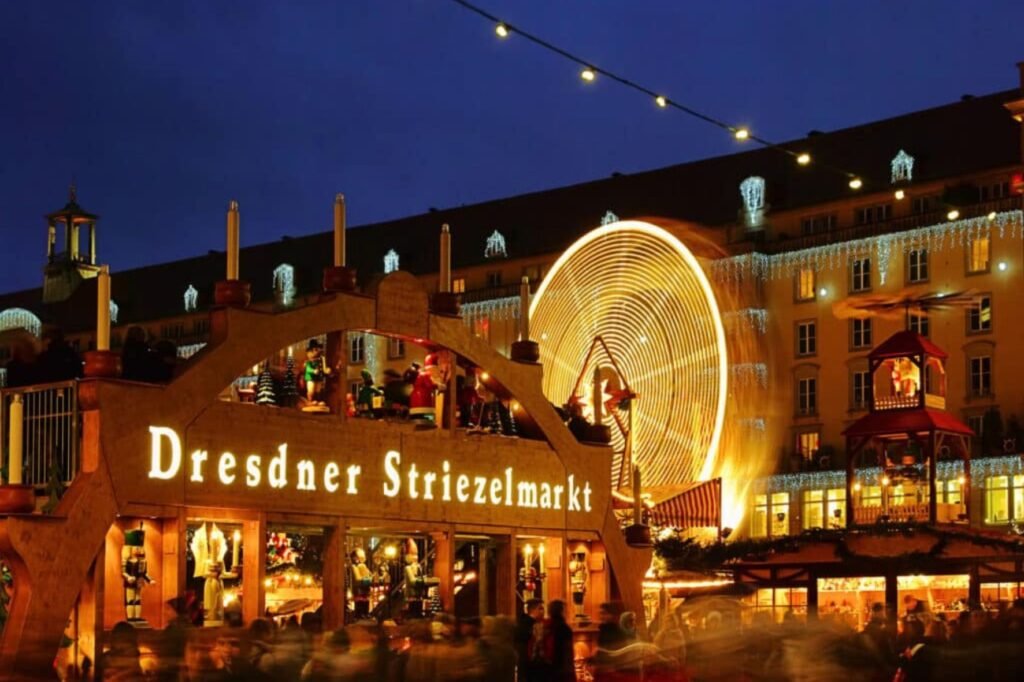
Do Christmas markets in Germany accept credit cards? I wondered the same thing before visiting these magical markets. The answer is both “yes” and “not always.” Many big markets in cities like Berlin, Munich, and Frankfurt accept credit cards at food stalls, souvenir stands, and for drinks like mulled wine. But smaller markets or traditional stalls often only take cash.
I found this out at a little market in a Bavarian village. I saw a stall selling handmade ornaments that looked like tiny works of art. I picked one out and reached for my card, but they only took cash. Luckily, there was an ATM nearby, but I felt a bit sad not to take my ornament home right away. After that, I made sure to carry enough euros for these kinds of moments.
German Christmas markets are special because they mix old traditions with modern touches. Some places are starting to use card payments, but part of the charm is keeping things simple. My tip? Bring some cash for treats like roasted chestnuts or gingerbread cookies, just in case. Still, many stalls do take cards, so you won’t have to worry too much.
There’s nothing like enjoying a warm cup of glühwein under the twinkling lights, knowing you’re ready for whatever catches your eye!
People share their experiences about places that accept or don’t accept credit cards.
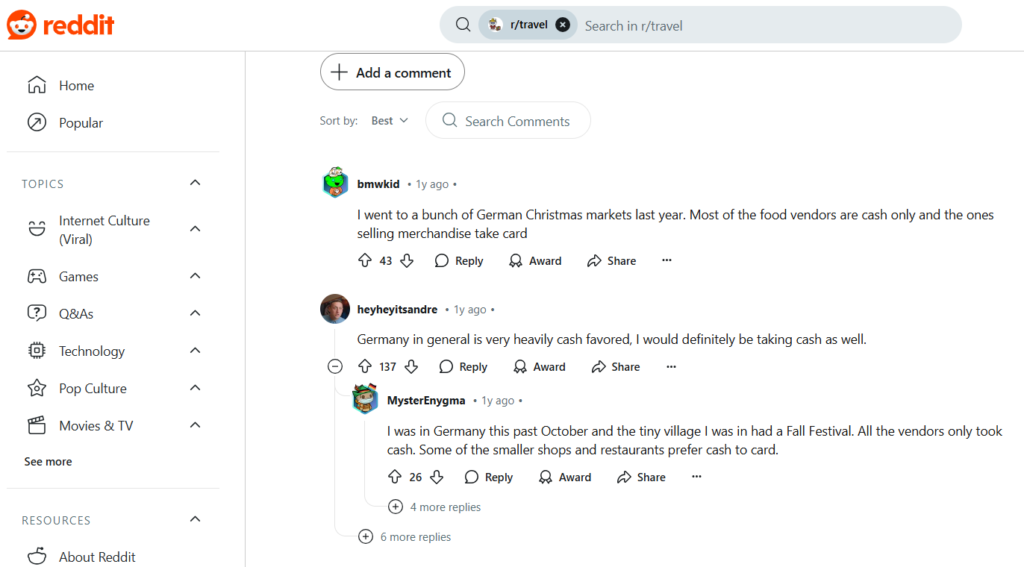
When do German Christmas market open in 2024?
In 2024, Germany’s Christmas markets will open in late November and run through December. Most markets start around the last week of November. Some may open as early as November 21st or 22nd. The exact dates depend on the city or region, but they usually stay open until Christmas Eve, December 24th.
Some larger markets, like those in Munich, Nuremberg, and Cologne, may stay open a few days longer, until after Christmas or even the New Year. The markets typically open in the afternoon and stay open into the evening. Many stay open until 9 or 10 PM, especially on weekends.
These markets are a great way to start the holiday season. They are filled with twinkling lights, delicious foods, handmade crafts, and Christmas cheer. If you plan to visit, check the dates for the city you’re going to. Some markets may have different opening schedules.
What to buy at German Christmas market?
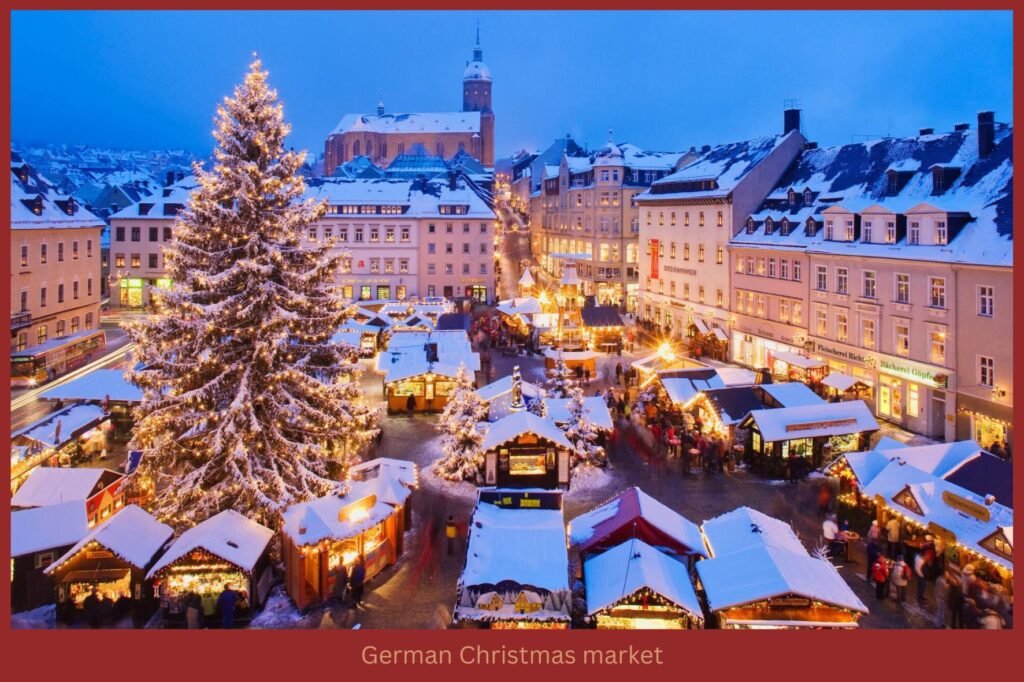
When I visited Germany’s Christmas markets, I was amazed by all the unique things to buy. The first thing that caught my eye was the beautiful handcrafted ornaments. They were made of wood or glass and made perfect souvenirs. I couldn’t resist buying a small wooden nutcracker. It was a classic German symbol, and I added it to my collection.
Another must-buy was the delicious food! Every stall had something tasty to try. Roasted chestnuts and sizzling sausages were my favorites. I also enjoyed the sweet treats, like lebkuchen (gingerbread cookies) and marzipan. They make great gifts for loved ones.
For a cozy souvenir, I bought a woolen scarf from a local vendor. The handwoven scarves kept me warm while I walked around the markets. It was a perfect memory of my trip.
Lastly, I tried mulled wine (glühwein). It was delicious! I even bought a special mug as a souvenir. I still use it in the winter. The markets are not just for shopping—they’re a fun experience with lots of wonderful finds!
Visit Frankfurt’s Christmas market
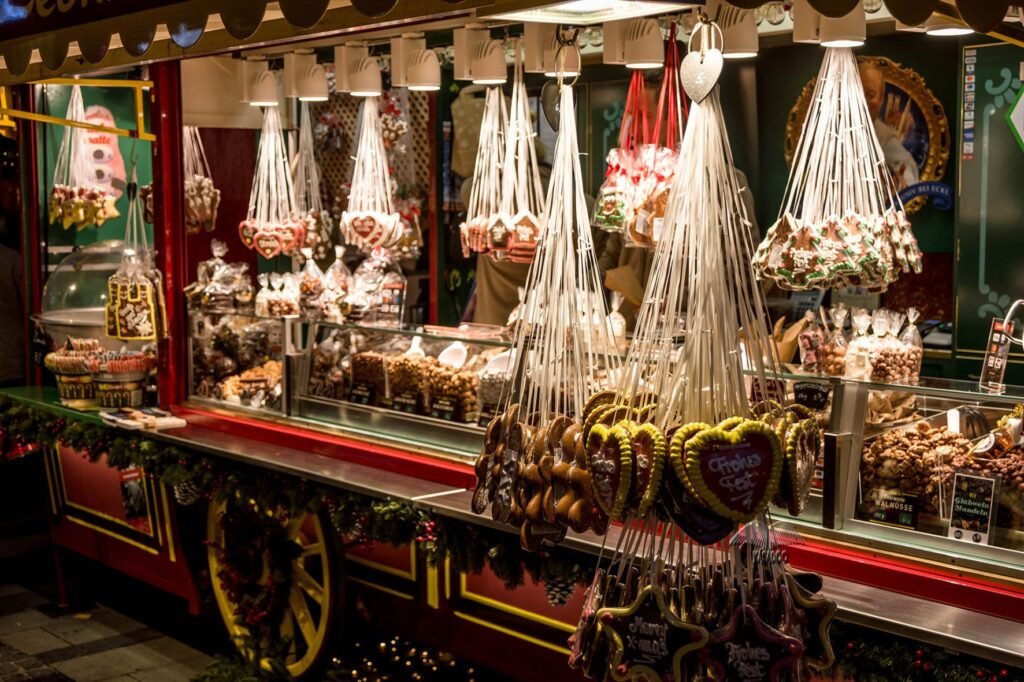
Frankfurt’s Christmas market, or Frankfurter Weihnachtsmarkt, is one of the oldest in Germany. Its history goes back to the 14th century. This market is a beloved tradition in the city. It started as a small Advent event where locals came together. They bought goods, shared joy, and celebrated the season.
By the 16th century, the market had grown much larger. It became an important event, bringing merchants from nearby areas. They sold handmade items, tasty treats, and seasonal gifts. The Römerberg Square, with its charming old buildings, became the center of the market. Even now, this square looks magical with bright lights and festive decorations.
A special treat of the Frankfurt market is the “Bethmännchen.” This is a marzipan pastry named after the Bethmann family. Visitors can still enjoy this sweet delight while exploring the market.
Over the years, the market faced challenges, including pauses during wars. But it always came back as a sign of hope and celebration. Today, Frankfurt’s Christmas market is a mix of old traditions and modern fun. It offers crafts, delicious food, and a cheerful atmosphere. It is a must-visit place during the holiday season!
Frankfurter Weihnachts markt program 2024
The Frankfurter Weihnachtsmarkt 2024 will take place from November 25 to December 22. It will be open daily from 10:00 AM to 9:00 PM, with Sunday hours starting at 11:00 AM. The market spreads across iconic locations like Römerberg, Paulsplatz, and Hauptwache, offering festive decorations, local delicacies, and unique handcrafted goods.
Key Highlights:
- Römerberg Square: Features Germany’s largest Christmas tree, festive stalls, and Advent concerts.
- Paulsplatz and Hauptwache: Offers family-friendly attractions like carousels and nostalgic tin toys.
- Sachsenhausen Christmas Market: Known for its cozy charm, with traditional crafts, apple wine, and musical performances.
- Special Treats: Don’t miss Bethmännchen (a marzipan pastry) and hot apple wine, both iconic to Frankfurt.
- Tower Blowing Tradition: Held at the Nikolaikirche, wind musicians play Christmas melodies every Advent Saturday.
- Frankfurt City Bells: A spectacular event where the bells of 10 inner-city churches ring harmoniously on special dates.
For families, there are opportunities to meet Santa Claus, while others can enjoy scenic performances and heated pubs. This year’s program is a blend of tradition and modern holiday cheer, making it an unforgettable experience.
If you’d like detailed schedules or additional updates, feel free to ask!
How to reach Frankfurter Market
Here’s a chart summarizing how to reach the Frankfurter Weihnachtsmarkt and the best transport options:
| Mode | Details |
|---|---|
| S-Bahn (Suburban) | Nearest stations: Hauptwache or Römer. Connects most of Frankfurt and its suburbs. |
| U-Bahn (Metro) | Closest station: Dom/Römer. Convenient for central Frankfurt travel. |
| Trams/Buses | Stops nearby include Paulskirche or Altstadt. Check local schedules for details. |
| From the Airport | Take S8 or S9 to Frankfurt Hauptbahnhof, then transfer to S-Bahn or U-Bahn. |
| By Car | Use city center parking garages. Parking near the market is limited; plan ahead. |
| On Foot/Bike | Accessible via pedestrian-friendly routes; bike racks available nearby. |
The market is centered around Römerberg Square in Frankfurt’s historic district. Public transport is the most convenient option, especially during the busy holiday season.
Pros and Cons of visiting German Christmas markets:
| Aspect | Pros | Cons |
|---|---|---|
| Festive Atmosphere | Magical lights, decorations, and music create a cozy, festive mood. | Can be very crowded, especially on weekends and evenings. |
| Unique Experiences | Iconic traditions like the Advent concerts, tower blowing, and specialty foods. | Smaller markets might lack variety compared to larger ones like Nuremberg or Frankfurt. |
| Local Cuisine | Enjoy seasonal treats like Glühwein, Bratwurst, and marzipan pastries. | Food and drinks can be pricey, especially in tourist-heavy markets. |
| Shopping | Handcrafted gifts, ornaments, and arts offer unique souvenirs. | Overwhelming choices; some items might be overpriced. |
| Cultural Insight | Explore local traditions and customs, unique to different regions. | Limited to Christmas themes; not ideal for those uninterested in holiday culture. |
| Accessibility | Central markets are well-connected via public transport. | Parking near markets is difficult, and public transport can be crowded during peak times. |
| Seasonal Joy | Great for family outings and creating memorable holiday experiences. | Cold weather and outdoor settings might be uncomfortable for some visitors. |
Tips:
- Visit on weekdays or early in the day to avoid large crowds.
- Bundle up to enjoy the open-air festivities in comfort.
- Research smaller, local markets for a more relaxed experience.
Let me know if you’d like specific examples or further insights!
Conclusion
German Christmas markets are magical! They are full of lights, music, and holiday cheer. Wooden stalls sell beautiful handmade gifts and delicious treats. You can enjoy Glühwein, warm pastries, and other seasonal snacks. The markets are also great for experiencing local traditions like Advent concerts.
However, they can get very busy, especially on weekends. Food and gifts might be expensive. Planning your visit helps a lot.
Despite the crowds, the joy and warmth make these markets special. They are perfect for families, friends, or anyone who loves Christmas! A visit will leave you with wonderful holiday memories.
FAQs
Q1: When do German Christmas markets open?
German Christmas markets generally open in late November and run until Christmas Eve or a few days before Christmas. Exact dates vary by city and region. For example, Frankfurt’s Christmas Market runs from late November to December 22nd.
Q2: How crowded are the markets?
During weekends and especially the week before Christmas, markets can be very crowded. To avoid large crowds, it’s best to visit on weekdays or earlier in the day.
Q3: What can I buy at German Christmas markets?
You can find beautiful handcrafted gifts, ornaments, wooden toys, candles, and festive decorations. Food stalls offer seasonal treats like Bratwurst, Glühwein, marzipan pastries, and warm chestnuts.
Q4: Are the markets family-friendly?
Yes! Many markets offer family-friendly attractions like carousels, petting zoos, and kid-focused activities. Some markets even have Santa Claus and Advent concerts.
Q5: What should I wear?
Since the markets are mostly outdoors, it’s important to dress warmly. Be sure to wear comfortable shoes, as you will be walking a lot. Don’t forget gloves, a hat, and a scarf.
Q6: Is it expensive to visit the markets?
The markets themselves are free to enter, but food, drinks, and gifts can be expensive. Glühwein mugs, for example, can cost around 2-5 Euros, and food portions may vary in price depending on the market【10†source】.
Q7: Can I pay with a credit card?
While many vendors now accept credit cards, cash is still widely used. It’s a good idea to carry some local currency with you for smaller stalls.
Q8: Where are the best markets to visit?
Some of the most popular Christmas markets include those in Nuremberg, Munich, Cologne, Frankfurt, and Dresden. Each market has its own unique charm, with some focusing more on local crafts, while others offer larger food and entertainment options.
Q9: What is the best time to visit?
To experience the magic without the overwhelming crowds, try to visit during the opening hours or on weekdays. Evening visits are beautiful due to the lights but expect more visitors during that time.
Q10: Are there special events or performances?
Many Christmas markets feature special performances like Advent concerts, carol singing, or even live nativity scenes. Some markets also have holiday-themed workshops or games for kids.

